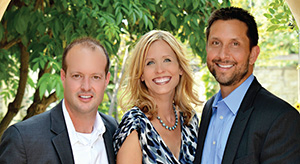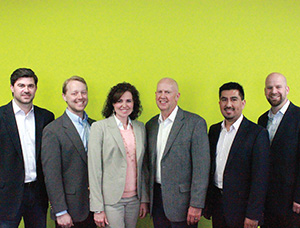
Left to right: Principals Scott Lippert, Jacquie Morgan and Michael Sommers.
BalancePoint
They call it a high-accountability, low-control environment. If you could draw that up on a chalkboard like a math equation, the sum would be: Growth. That’s what the three principals have been cranking out at the work-force solutions company since its founding in 2004. Since then, its revenues have passed the $18 million mark, and the staff has grown to 76 full-time employees who provide IT and strategic consulting, staffing and leadership-development services.
Last year, BalancePoint ranked No. 50 on Ingram’s Corporate Report 100 list of the fastest-growing companies in the region, and made it onto the Inc. 5000 list in 2013, for the third time.
What’s driving that? It’s part vision of founders Jacquie Morgan (the COO), Michael Sommers (the CMO) and Scott Lippert. It’s part mission. And it’s part environment, which starts with what the principals call a values-driven culture infused with fun. Culture can be a tough nut to crack, because if you don’t nail it at start-up, it’s hard to remain authentic, despite your best efforts to change it.
At BalancePoint, there’s a solid foundation of benefits for a company that is small and young: medical, dental, vision and life insurance; paid vacation, holidays and birthdays, a 401(k) plan with a 2 percent company match, and a 529 college savings plan. There’s also a corporate fitness center at the south Kansas City headquarters on Ward Parkway, and employees are allowed to bring their families in to use it, as well.
The company has partnered with World of Fun, Oceans of Fun and Schlitterbahn to offer discount passes for employees and their families. Here’s a nice touch: For employees with kids, BalancePoint also provides up to $500 per child, every year, for sponsorship of various academic activities, 529 savings plans or athletic programs.
The focus on children extends to corporate philanthropy, as well. The company has made a cause of Children International, and adds more overseas beneficiaries as goals are met. Attainment of this year’s goal would fund employees trips to Guatemala to meet the company’s Children International family—an effort that has brought a new sense of urgency to the staff.

(l–r): Nick De Buyl, Director of Sales; Gavin Guest, Director of Product Development; Deanna Ferrante, VP-Customer Success; Wayne Morgan, Chief Operating Officer; Carlos Antequera, CEO & Co-founder; Dan O’Reilly, Director of Marketing and Lead Generation.
Netchemia
Well, whaddaya know: The leadership team at Netchemia rolled out a new policy of unlimited paid time off this year—within certain parameters, of course—and employees are still showing up for work. As a result, the company not only remains in business, but is thriving. Food for thought among those managers with trust issues.
It’s a change that has increased an already high level of employee satisfaction at Netchemia, a Prairie Village-based company that designs and produces software programs that help school systems operate more efficiently. The way things are going, the company won’t be a small business for long—bolstered by a $6 million venture-capital infusion from Mainsail Partners of San Francisco last year, and by the acquisition of an educational-tech company in New England earlier this year, the company founded by CEO Carlos Antequera in 2001 has gone from 35 employees last year to more than 90, with plans to surpass 100 by year’s end.
The formula for success, says talent acquisition director Risa Haug, is the company’s fusion of entrepreneurship, passion, creativity, teamwork, and customer service. A visual representation of that is the company foosball table, where the call of noon and the end of the workday summon the troops, demonstrating an authentic work hard/play hard culture. That dynamic also plays out with company trips to Royals games, Thanksgiving 5K runs and service days at Operation Breakthrough.
The trick to putting together an effective, fast-growth company, Haug says, is a hiring strategy that adheres to company core values. “We hire for cultural fit over position-specificity. As a company, we place importance on hiring individuals who embody our core values and placing them in roles where their strengths are maximized both for personal and company success,” she said.
They call themselves Netchemians, and new hires straight out of college collaborate with employees at all levels, including the six-member executive team, whose desks are out among those of the troops—no cubicles, no individual offices. Netchemia’s work culture is defined by its transparency. Every month, employees are summoned for a review of the previous month’s numbers for each area of operation, analyzing goals missed and goals exceeded.
New hires are reviewed at 30, 60 and 90 days, and all employees do the drill twice a year to ensure that all are on track with their own goals, and that those are aligned with corporate goals. The pace of growth means opportunities for career advancement are frequent, and the policy is to hire within first.

Standing, (l-r) Marc Shaffer, Principal; and Mike Searcy, President. Inset: Jessica Maldonado, Vice President.
Searcy Financial Services
It’s one thing to boast about having a competitive pay structure, even at a small company. At Searcy Financial Services, the commitment is more specific: The organizational goal is to provide top-quartile pay according to industry standards, and it conducts annual reviews to gauge those benchmarks and ensure that it remains in that lofty territory.
With just seven full-time employees, the Overland Park wealth management firm may be among the smallest to be accorded Best Companies to Work For honors, but owner Mike Searcy shows he can set a benefits strategy that matches many large employers, step for step. Employees are safeguarded against inflation with CPI raises, but also have the opportunity to earn merit pay. There’s tuition reimbursement for courses needed to earn or maintain licensing and credentials, plus time off for continuing-ed requirements. Sales associates are motivated by the uncapped earning potential, and the PTO policy affords two weeks paid vacation, six sick days and a quarterly “free” day. On top of a match of 4 percent of employee salary in the 401(k) program—a level that would put to shame more than one Fortune 500 company—there’s a scorecard for additional profit sharing and incentives.
There’s even remote officing—two members of Searcy’s staff, in fact, log in from across long distances, yet still provide seamless integration into the operation. That’s made possible by the firm’s embrace of technology to shorten distances and improve efficiencies. The firm provides iPads, iPhones and cloud-based programs that allow its staff to get things done from almost anywhere, any time.
The 38-year-old firm also commits staff resources to community service. Each quarter, it contributes a paid day where the staff, as a group, engages in activities that support a charity designated specifically for that three-month period. And the Searcy Spinners, as a BikeMS team, has raised more than $30,000 for that cause.